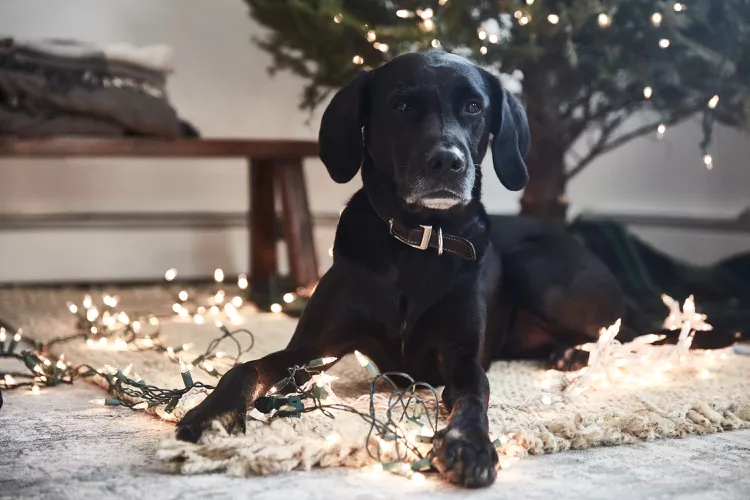Are Christmas Trees Poisonous to Cats and Dogs?

During the holiday season, you’re likely overwhelmed by your to-do list—picking the perfect gifts, cutting down the most beautiful tree, and baking mouth-watering goodies to share. With the many tasks filling your days, you may not be able to dedicate as much time as you normally do to your furry friend, allowing your pet to find mischief. Exciting household items emerge from the attic once a year, tempting your pet into causing trouble if you’re not careful.
While pets can be attracted to delicious smells wafting from the kitchen, glittering decorations adorning the tabletops, or brightly colored greenery spread throughout your home, many cats and dogs are awed by the star of the show—the Christmas tree. Outfitted in sparkling lights, shiny baubles, and at the perfect height for climbing or chewing, many Christmas trees have met their fateful end at the paws of a pet.
Although you may be worried about your Christmas tree’s demise, what about your pet? Are the needles your kitty chewed on toxic? What about the water in the tree stand that your pup slurped up? Let’s discover how dangerous Christmas trees are for cats and dogs, and what other holiday decorations may cause toxicity issues in your pet.
The Dangers Associated With Christmas Trees
While you may have visions of stringing popcorn garlands, tinsel strands, and salt dough ornaments along your beautiful fir tree, your pet will be drooling at your feet, eager to make a snack out of the conveniently hung treats. Even without food-based and shiny decorations, your Christmas tree can pose a threat to your furry friend. Before setting up your Christmas card photo of your pet bedecked in antlers or an elf hat in front of the tree, consider these potential hazards:
- Live Trees: Fir, spruce, and pine trees make excellent Christmas trees and are generally non-toxic to pets. The needles, however, can cause oral irritation and in excessive amounts, gastrointestinal upset.
- Artificial Trees: Although fake trees are oil- and sap-free, they can create gastrointestinal issues, depending on what material makes up the tree.
- Fertilized Water: If you put your Christmas tree up the day after Thanksgiving, you will want to ensure it lasts until Christmas by adding fertilizer or preservatives to the water. These chemicals, mold, and bacteria can make your pet ill if they drink from the tree stand.
- Ornaments: Your pet may think your glass baubles, clay keepsakes, and ceramic ornaments are excellent toys for batting, but they can crash to the floor and shatter, cutting paws.
- Lights: Dazzling strands of light can intrigue your cat and delight your dog, but are choking hazards and can lead to electrical burns.
Holiday Plant Poisons
Besides the star attraction of the Christmas season, other holiday plants can take the stage with causing toxicity in your pet. Avoid these four most dangerous plants when decorating for the holidays:
- Mistletoe: This plant can cause gastrointestinal upset and in rare cases, cardiovascular problems with cats and dogs.
- Holly: The holly plant can create mechanical injuries through its pointed leaves. Holly also contains soap-like compounds in the berries, called saponins, which can cause issues if consumed. The berries and leaves are toxic to pets and can lead to salivation, vomiting, and diarrhea.
- Lilies: Cats are highly sensitive to lilies. In fact, they’re so sensitive that grooming lily pollen off their fur can lead to kidney failure. Other signs of lily toxicity can include gastrointestinal upset, heart arrhythmias, and convulsions. Dogs do not develop kidney failure from eating lilies like cats do, but may have some minor stomach upset.
- Amaryllis: The bulb of this beautiful bloom can cause salivation or oral irritation and excessive quantities can cause gastrointestinal upset.
You may wonder why the poinsettia is not listed as a toxic holiday plant. Although many people believe that poinsettias can kill their pets, that is a rarity. A pet would have to ingest a massive amount of this plant to cause poisoning, and most pets won’t eat a large enough amount because of the irritating taste and feel from the sap. At most, your pet may experience vomiting and salivation, but will likely stop eating the plant once she discovers how irritating the sap is to their mouth and throat. To be on the safe side, ensure all plants are kept out of paw’s reach.
How to Prevent Christmas Plant Toxicities in Your Pet
Avoid dampening your holiday cheer with an emergency veterinary visit by following these tips:
- Double check your plant placement, as cats can jump high enough to reach plants placed out of reach. Consider keeping your holiday plants behind closed doors in people-only rooms instead.
- If your pet is a known chewer, choose artificial plants over real ones. But, too much chewing on plastic or fabric plants can lead to a foreign body obstruction if ingested.
- Barricade your Christmas tree behind baby gates or pens to keep your pet out.
When in doubt, check out the ASPCA’s list of toxic and non-toxic plants before adding greenery and bright blooms to your home. But, if your pet nibbles on your plant, no matter what type, be sure to contact your veterinarian or animal poison control for advice.